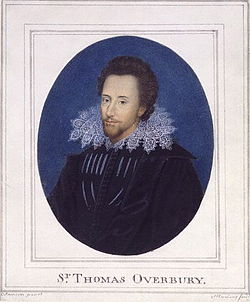Sir Thomas Overbury
| Sir Thomas Overbury | |
|---|---|
 |
|
| Born |
Thomas Overbury 1581 Compton Scorpion, Warwickshire, England |
| Died | 14 September 1613 Tower of London, London |
| Cause of death | Poison |
| Resting place | Tower of London |
| Nationality | English |
| Education | Middle Temple |
| Alma mater | Queen's College, Oxford |
| Occupation | Poet, courtier |
| Employer | Robert Carr |
| Known for | Poetry, his murder |
| Title | Sir |
| Opponent(s) |
Frances Howard Henry Howard Thomas Howard Charles Howard Lord Knollys Queen Anne of Denmark Sir Thomas Lake |
| Parent(s) | Nicholas Overbury, Mary Palmer |
| Relatives | Brother: Sir Giles Overbury |
Sir Thomas Overbury (baptized 1581 – 14 September 1613) was an English poet and essayist, also known for being the victim of a murder which led to a scandalous trial. His poem A Wife (also referred to as The Wife), which depicted the virtues that a young man should demand of a woman, played a large role in the events that precipitated his murder.
Thomas Overbury was born at Compton Scorpion, near Ilmington in Warwickshire, a son of the marriage of Nicholas Overbury, of Bourton-on-the-Hill, Gloucester, and Mary Palmer. In the autumn of 1595, he became a gentleman commoner of Queen's College, Oxford, took his degree of BA in 1598, and came to London to study law in the Middle Temple. He soon found favour with Sir Robert Cecil, travelled on the Continent, and began to enjoy a reputation for an accomplished mind and free manners.
About 1601, whilst on holiday in Edinburgh, he met Robert Carr, then an obscure page to the Earl of Dunbar. A great friendship was struck up between the two youths, and they came up to London together. The early history of Carr remains obscure, and it is probable that Overbury secured an introduction to court before his young associate contrived to do so. At all events, when Carr attracted the attention of James I in 1606 by breaking his leg in the tilt-yard, Overbury had for some time been servitor-in-ordinary to the king.
In June 1608, Overbury was knighted by the king. From October 1608 to August 1609 he traveled to the Netherlands and France, staying in Antwerp and Paris. Upon his return he began following Carr's fortunes very closely, and "such was the warmth of the friendship, that they were inseparable,… nor could Overbury enjoy any felicity but in the company of him he loved [Carr]." When the latter was made Viscount Rochester in 1610, the intimacy seems to have been sustained. With Overbury's aid, the young Carr caught the eye of the King, and soon became his favorite. Overbury had the wisdom and Carr had the King's ear into which to pour it. The combination took Carr swiftly up the ladder of power. Soon he was the most powerful man in England next to Robert Cecil.
...
Wikipedia
